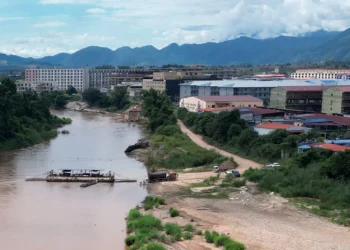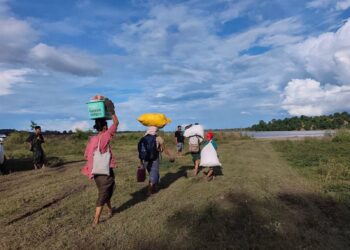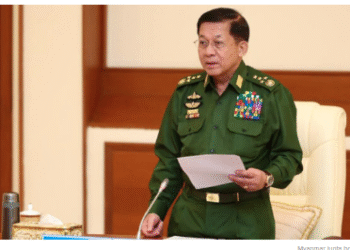Conditions in Myanmar’s jails are dire for all inmates, but human rights organisations say political prisoners suffer more abuses – including medical neglect that often has deadly consequences.
By RACHEL MOON | FRONTIER
“Emergency! Emergency!”
A chorus of voices erupted from a ward of Kyaikmayaw Prison late on January 15. When the guards arrived after midnight, prisoner Ko Pyae Phyo Aung had already fainted from excruciating pain in his abdomen.
He was taken to the prison hospital, but the doctor who was supposed to be on duty wasn’t there. Despite Kyaikmayaw being a major prison near the Mon State capital of Mawlamyine, the only healthcare worker available was the doctor’s assistant, a prisoner who was a dentist by trade.
The dentist gave the patient an injection to relieve his pain while the prison staff frantically called the doctor. But it was too late: Pyae Phyo Aung had begun to tremble and he collapsed with foam spilling from his mouth. He died a few minutes later, aged only 31.
Pyae Phyo Aung was a political prisoner. Formerly a firefighter in Yangon’s Insein Township, he left this government job after the 2021 coup and joined the Civil Disobedience Movement against the regime. In January 2022 he was arrested while fleeing to join an armed resistance group in Kayin State and subsequently sentenced to seven years in jail on terrorism charges.
Ko Wai Mon*, a recently released prisoner who shared the same dormitory, believed Pyae Phyo Aung’s abdominal pains would not have been deadly if a doctor had properly diagnosed and treated them.
“They didn’t try to find out what was happening to him,” Wai Mon told Frontier of the prison authorities.“He started feeling abdominal pain a few days before. But they only gave him cheap painkillers like Paracap. The prison doctor must take the responsibility because if he hadn’t been missing from duty that day, Ko Pyae Phyo Aung wouldn’t have died.”
That is not the only recent alleged case of fatal neglect in Kyaikmayaw Prison. Four days before Pyae Phyo Aung’s death, 43-year-old political prisoner Ko Yar Shin died due to untreated injuries suffered during interrogation, said Ko Thaik Tun Oo, spokesperson for the Political Prisoners Network-Myanmar
But Kyaikmayaw is far from an exception. The PPNM says 27 political prisoners have died due to medical neglect between June 1 last year, when the organisation was founded, and April 7.
Late doctors, blocked deliveries
While conditions in Myanmar jails are bad for all inmates, the PPNM and other human rights groups say the junta is deliberately denying healthcare to political prisoners while also persecuting them in other ways.
Another support and monitoring group, the Assistance Association for Political Prisoners, says there are 20,360 such inmates in Myanmar.
Ma Zue Zue May Yun, founder of the Women’s Organisation for Political Prisoners, was imprisoned from April 2021 to January last year for assisting protesters and members of the CDM. She said that during her time in Yangon’s Insein and Bago Region’s Daik-U prisons, political prisoners shared dormitories with criminals, who were often given authority over them.
Former political prisoner Ko Aung Soe demonstrates how he was shackled while inside a prison cell, during an exhibition at the University of Yangon on August 6, 2018. (AFP)
“The prison appoints the criminals as Tan See [supervisors]. The prison staff favour those Tan See who oppress political prisoners, and if there’s a fight between a criminal and a political prisoner, they only take action against the latter,” she told Frontier.
Political prisoners said this discrimination also extends to medical attention.
“If a common prisoner asks for help, the doctor arrives at the cell in 15 minutes, but when a political prisoner needs assistance, the doctor will arrive one hour to an hour and a half later,” said Ko Myo Lwin*, a political prisoner who was released from Daik-U Prison last year.
“They are deliberately preventing political prisoners from accessing healthcare,” he told Frontier.
A woman who spent more than two years in Mandalay’s Obo Prison said in 2023 she saw three fellow political prisoners give birth in their cells after guards refused to send them to the hospital.
“All three mothers had to give birth with the help of other prisoners because there was no medical staff,” she told Frontier.
The denial of care shifts the burden to inmates’ family members like Daw Shwe Tin*, a Yangon resident in her 50s. Every month she has to scrape
together money to buy and send medicines to her daughter in Insein Prison, where she’s serving a two-year sentence under the Counter Terrorism Law for raising funds for armed resistance groups.
The young woman was jailed in August 2022, soon after undergoing surgery to remove a tumour from her intestine. “My daughter has to take medicine and vitamins every day for her intestine and weak heart,” Shwe Tin told Frontier.
Shwe Tin’s costs shot up in July last year, when she had to start paying bribes for the medicines to be delivered at all. Packages sent to political prisoners are typically subjected to intense scrutiny. Officially, authorities now only permit parcels of Myanmar traditional medicine, which is far less effective.
“I have to pay K20,000 [almost US$11 at the market rate] for a bottle of medicine to reach my daughter,” she said. “That means an extra K60,000 to bribe the guard every month. Including the cost of the medicine, I have to spend around K250,000 per month for my daughter.”
The official ban on such deliveries seemed to coincide with the appointment on July 12 of Colonel Myo Swe as director-general of the Prisons Department. Guards explained to Shwe Tin that people had been caught smuggling drugs disguised as medicine.
“Even if that’s true, they shouldn’t block all [non-traditional] medication. Now my daughter often faces shortages,” she said, suggesting that even with bribes, deliveries are rarely smooth and all packages are subject to intense scrutiny. “Lately, it’s become more difficult to get her the medication on time. It usually takes at least a week.”
PPNM spokesman Thaik Tun Oo said the guards’ explanation is absurd. While he was in prison, he claimed, it was ordinary criminals who used and traded drugs, not political prisoners, and they were often openly smuggled with the connivance of prison officials.
“Some criminals even sent the money they earned dealing drugs back to their homes each month through corrupt prison officials,” said Thaik Tun Oo, who spent two years in Mandalay Region’s Obo and Myingyan prisons for alleged incitement against the military before being released in May last year.
“If you have money, you can do whatever you want in prison. Restricting parcels just creates more bribery opportunities for corrupt guards,” he added.
Myo Lwin, the ex Daik-U inmate, said only wealthier prisoners and family members can keep paying for medical deliveries.
“No one can receive medicine without permission from the chief medical officer. So only the prisoners who can afford bribes [to receive this permission] can get it,” he said, adding that sometimes they share their medication with poorer inmates.
Groups such as PPNM try to help with the cost of deliveries, but they’re limited by the need to work covertly. “Our members in the country are mainly working underground,” said Thaik Tun Oo. “Already five members of our organisation have been detained by the military.”
‘Killing with intent’
Meanwhile, abysmal living conditions in prisons contribute to inmates’ health problems.
WOPP founder Zue Zue May Yun said virtually every prisoner suffers from skin infections due to dirty water and poor nutrition, which causes other illnesses too.
“There were insects in the rice and the curry most of the time, but even though it was gross, we couldn’t be picky because we were so hungry. The conditions in prison worsened over the time I was there,” she said, adding that the septic tanks were always overflowing.
Seven former political prisoners told Frontier that inmates in Myanmar jails often sleep in packed dorm rooms of about 20 square metres, shared at times by up to 70 prisoners.
In June 2022, the International Committee of the Red Cross requested permission to resume prison inspections, which were suspended in March 2020 following the outbreak of the COVID-19 pandemic. Although the ICRC had been granted access since 1999, the regime rejected the new request.
“The ICRC is trying to negotiate with the Myanmar junta but so far without success,” said Thaik Tun Oo of the PPNM. “It’s obvious that the junta is meeting with the ICRC just for show, and that they don’t want to allow aid groups into prisons.”
The ICRC told Frontier it cannot comment on the matter besides confirming that “discussions on the resumption of its prison visits are ongoing.”
AAPP spokesperson U Aung Myo Kyaw told Frontier that healthcare in prisons today is even worse than during his 10 years as a political prisoner under the previous junta, from 1992-1999 and 2002-2004.
“In our day, it wasn’t that difficult to order medicine from outside or get transferred outside for medical treatment,” said Aung Myo Kyaw, who believes the current neglect is deliberate.
“The junta doesn’t want anyone who supports the revolution to survive. They want to make it look like the people in prison are dying because of their ill health,” he said. “In our time, there were not as many political prisoners who died in prison as there are now.”
Lawyer U Khin Maung Myint said prison authorities are legally obliged to provide healthcare to inmates “without delay”.
“In the 1894 Prisons Act, Jail Manual and 1900 Prisoners Act there are quite detailed provisions on prisoners’ healthcare. Under the civilian governments from 2011 into 2021, we noticed that healthcare in the prisons improved,” he said. “But since 2021, medical treatment in prisons has been very poor… especially for political prisoners. Some of them aren’t given treatment at all.”
Khin Maung Myint said negligent prison officials should one day be held to account.
“If the death is caused by a wilful failure to comply with laws and regulations, it amounts to killing with intent,” he said. “We may not be able to take action in this period of lax law enforcement, but in the future, when the rule of law is strengthened, the victims’ families should have the right to file a case for murder against the relevant prison authorities.”
*indicates the use of a pseudonym for security reasons






